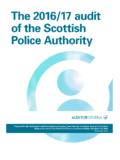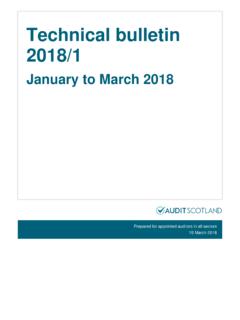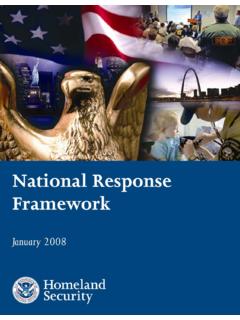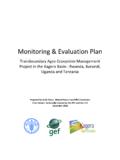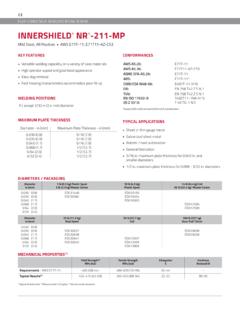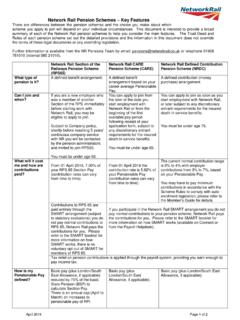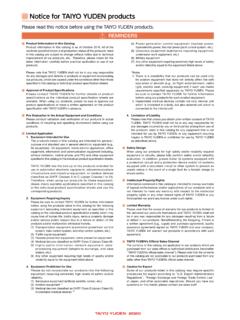Transcription of NHS in Scotland 2017
1 NHS in Scotland 2017. Prepared by Audit Scotland October 2017. NHS in Scotland 2017. The Auditor General's role is to: appoint auditors to Scotland 's central government and NHS bodies examine how public bodies spend public money help them to manage their finances to the highest standards check whether they achieve value for money. The Auditor General is independent and reports to the Scottish Parliament on the performance of: directorates of the Scottish Government government agencies, eg the Scottish Prison Service, Historic Environment Scotland NHS bodies further education colleges Scottish Water NDPBs and others, eg Scottish Police Authority, Scottish Fire and Rescue Service. You can find out more about the work of the Auditor General on our website: Audit Scotland is a statutory body set up in April 2000 under the Public Finance and Accountability ( Scotland ) Act 2000.
2 We help the Auditor General for Scotland and the Accounts Commission check that organisations spending public money use it properly, efficiently and effectively. NHS in Scotland 2017 | 3. Contents Summary 4. Introduction 7. Part 1. The NHS in Scotland in 2016/17 11. Part 2. Achieving change 27. Endnotes 41. Appendix 1. Audit methodology 44. Appendix 2. Financial performance 2016/17 by NHS board 45. Appendix 3. NHS performance against key LDP standards by NHS board in 2016/17 46. PDF download Web link Interactive Tableau exhibit, where further information can be viewed at an NHS board level Exhibit data When viewing this report online, you can access background data by clicking on the graph icon.
3 The data file will open in a new window. 4|. Summary Key messages 1 Every day the NHS provides vital services to thousands of people across Scotland . It has a budget of around 13 billion each year, equivalent to 43 per cent of the overall Scottish budget in 2016/17. At some time in their lives, everyone in Scotland will use a service provided or funded by the NHS, from dentists and GPs to hospital services such as maternity and orthopaedics. In 2016/17, the NHS in Scotland employed almost 140,000. whole-time equivalent staff, performed million hospital procedures and conducted an estimated 17 million GP consultations. 2 The NHS in Scotland is 70 years old next year. In the intervening decades since it was set-up demographic and health trends have changed significantly and demand for services has increased dramatically.
4 We have reported many times on the challenges facing the NHS including increasing costs, growing demand, and the continuing the NHS. pressures on public finances. In 2016/17, these challenges continued to intensify. Demand for healthcare services continues to increase and faces more people are waiting longer to be seen. For example, the number of increasing people waiting for their first outpatient appointment increased by 15 per cent in the past year and there was a 99 per cent increase in the number challenges of people waiting over 12 weeks. Scotland 's health is not improving and and crucial significant inequalities remain, while general practice faces significant challenges, including recruiting and retaining GPs and low morale.
5 In building the face of this, NHS staff have helped maintain and improve the quality blocks to of care the NHS provides. Yet there are warning signs that maintaining the quality of care is becoming increasingly difficult. The findings in this enable year's report illustrate why the way healthcare is planned, managed and change still delivered at all levels in Scotland must change. need to be 3 Healthcare is likely to look very different in future. Health and social care integration marks a significant change in how the different parts of the put in place health and social care system work together and how the Scottish public will access and use services in future. Yet the scale, complexity, and interdependencies of health and social care make achieving the changes needed a highly complicated and long-term undertaking.
6 A number of factors provide a positive basis on which to build. Scotland has had a consistent overall policy direction in health for many years and there is broad consensus on the aim that everyone will be able to live longer, healthier lives at home or in a homely setting. Staff remain committed to providing high-quality care and there is a continued focus on safety and improvement. Levels of overall patient satisfaction continue to be high and the Scottish public hold the NHS in high regard. There are also early signs that changes in the way services are planned and delivered are Summary | 5. beginning to have a positive impact. For example, delayed discharges have reduced in a number of areas and this provides opportunities for sharing learning across the country.
7 4 There is no simple solution to addressing the issues facing the NHS. and achieving the changes required. Previous approaches such as providing more funding to increase activity or focusing on specific parts of the system are no longer sufficient. Attention needs to focus on overcoming a number of barriers to change. Managing the health budget on an annual basis is hindering development of longer-term plans for moving more care out of hospital. It is still not clear how moving more care into the community will be funded and what future funding levels will be required. A clear long-term financial framework is a critical part of setting out how change will happen and when. Culture change is an essential part of transforming health and social care services.
8 A different way of involving the public and staff in how they access, use and deliver health and care services is needed to help make the necessary difficult decisions. More information about how the NHS is working and the impact changes have on different parts of the system would help. For example, there are indicators measuring access to acute care services, such as hospitals, but there is little or no monitoring of activity levels and still little public information about primary care, such as GP practices, and community care. Recommendations To provide the foundations for delivery of the 2020 Vision and changing the way healthcare services are provided: The Scottish Government should (paragraphs 63 70): develop a financial framework for moving more healthcare into the community which identifies: the anticipated levels of funding available for future years across the different parts of the healthcare system how funding is anticipated to be used differently across NHS.
9 Boards and integration authorities to change the way services are delivered develop a longer-term approach to financial planning to allow NHS. boards and integration authorities flexibility in planning and investing in the longer-term policy aim of developing more community-based services. The Scottish Government, in partnership with NHS boards and integration authorities, should (paragraphs 71 78): develop a capital investment strategy to ensure the NHS. Scotland estate is appropriate for delivering more regional and community-based services continue to develop a comprehensive approach to workforce planning that: 6|. reflects forecasts of future staffing and skills requirements to deliver changing models of healthcare provision at regional, local and community level provides a clear breakdown of transitional and future costs to meet projected demand through additional recruitment and training.
10 To improve governance, accountability and transparency: The Scottish Government should (paragraphs 61 62): develop a robust governance framework for the delivery of the Health and Social Care Delivery Plan. This should: set out all the work currently under way and planned, and the interrelationships between them move on from statements of intent to developing the specific actions, targets and timescales to deliver all of its workstreams and plans, to allow better oversight and progress to be assessed and reported publicly simplify and make clear the lines of accountability and decision- making authority between the Health and Social Care Delivery Plan Programme Board and major work programme delivery oversight groups, regional boards.



